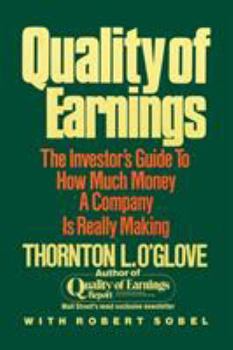Quality of Earnings
Select Format
Select Condition 
Book Overview
From Simon & Schuster, Quality of Earnings is an investor's guide to how much money a company is really making.From Thornton L. O'glove, Quality of Earnings is an indispensable guide to determining how much money a company is really making and for buying and selling stocks without making costly blunders.
Format:Paperback
Language:English
ISBN:0684863758
ISBN13:9780684863757
Release Date:October 1998
Publisher:Free Press
Length:224 Pages
Weight:0.85 lbs.
Dimensions:0.6" x 6.0" x 9.1"
Customer Reviews
5 ratings
Very Good for value investors
Published by Thriftbooks.com User , 15 years ago
If you are a value investor, this is a book for you. It tells you to analysis each company and how to identify red flags.
Check what a company reports to IRS
Published by Thriftbooks.com User , 15 years ago
This is a great book. The most valuable lesson I learned from it is to analyze the differences in income reporting to the IRS vs. reporting to shareholders. All companies keep two types of books, one for the IRS and one for shareholders. There are times when an expense can be deducted from a taxable income on the tax return, but it may not be deducted under the GAAP rules. As an investor, I am interested in knowing what a company reports to the IRS and how this number compares to what it reports to shareholders. Since most of the investors do not even bother to check this discrepancy, the dishonest management may deceive investors by hiding certain expenses. - Mariusz Skonieczny, author of Why Are We So Clueless about the Stock Market? Learn how to invest your money, how to pick stocks, and how to make money in the stock market
Still worth reading
Published by Thriftbooks.com User , 21 years ago
17 years later and many things have changed. The desire of investors to accurately gauge the stability of the companies in their portfolios remains the same. The incentive of management with stock options to hide the true nature of what the reality of what the company's earnings have been remains strong. Some of the techniques mentioned will be hard to use when companies employ SPEs to hide their true indebtedness and derivative positions mask the Value at Risk. However, many of the technique still have value. The analysis of receivables and inventories can provide insight into the immediate future of the company. The techniques that have lost their clear edge are the debt and write-off analysis. Write-offs are now required by GAAP (although the "big bath" write-offs are still "non-recurring") and SPEs or variable interest entities can obscure debt. It is fascinating in light of Enron, WorldCom, Qwest, Tyco, and Adelphia the stories of companies in the 70s and 80s that were attempting to do the same thing (though often without the fraud). How little man changes through the ages.
Excellent to learn financial analysis
Published by Thriftbooks.com User , 22 years ago
This book is very effective in introducing people to critical financial statement analysis. It helps to have some accounting background though. The material in this book will reinforce a lot of the important financial/accounting concepts that all investors should at least understand before committing to an investment. The author makes the accounting concepts interesting and accessible for most people. In short, the book is a great way to learn/reinforce important financial analysis techniques.
A stock owner & short seller's manual
Published by Thriftbooks.com User , 24 years ago
"Quality of Earnings" takes a vital approach toearnings analysis--looking beyond raw earnings as spun by companymanagement for "the street". O'Glove covers basics (Chapter1: "don't trust your [sell-side] analyst"), and goes on toincredibly important basics that most individual investors are notexposed to through CNBC and other mass media outlets (includingsell-side analysts' reports). Example: tracking inventory build-up andaccounts receivable levels can make you a lot of money(short-selling--note: this is a very risky practice), or alternatelysave your rear end (if "long-only"). "Shareholderreporting versus tax reporting," has its own chapter--as itshould. I would pay 10 times the price of the book just for thischapter, as the concept is unique as far as I've read.The CFRA... and various other firms use the same simple concepts in this bookto advise their giant money-manager clients about the quality ofvarious public companies' earnings. Money managers pay many thousandsof dollars a year for research based on the principles offered in"Quality of earnings". A warning: reading this bookcoupled with listening to public companies' management may lead you toshort selling; if you remain "long only", this book maymerely save your rear end."Quality of Earnings" is aimedat those who are willing to devote a little time to research on whatthey own; there are no hard & fast rules in here, just businesscommon sense and insight honed through years of work andobservation. This book and Schilit's "FinancialShenanigans" remain very close to my heart.






